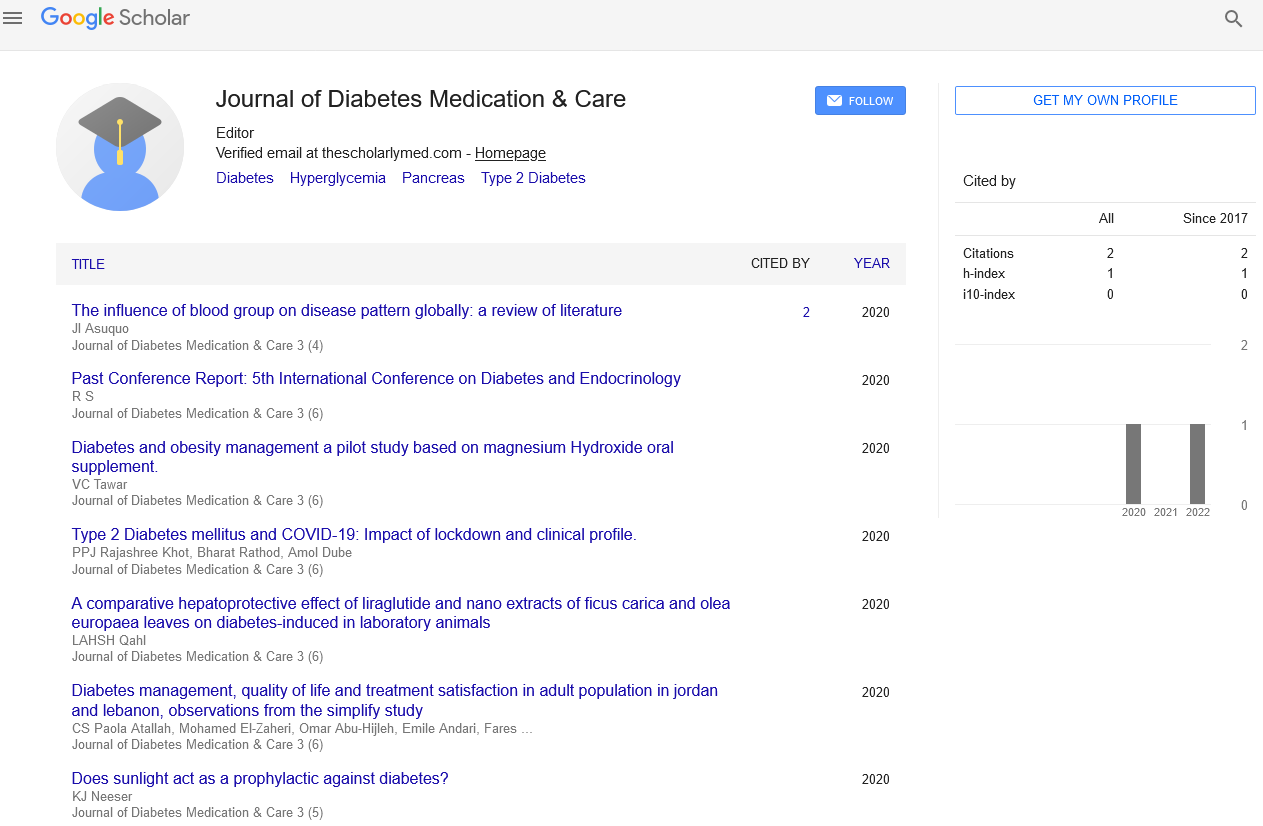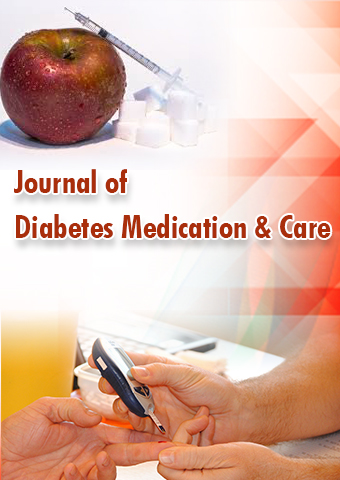Perspective - Journal of Diabetes Medication & Care (2023) Volume 6, Issue 5
A Holistic Approach to Managing Diabetes and Obesity
- Corresponding Author:
- Ian Kellar
Department of Endocrinology, University of Milan, Milan, Italy
E-mail: ish2561@mehl.cm.ac.uk
Received: 05-Sep-2023, Manuscript No. JDMC-23-119069; Editor assigned: 08-Sep-2023, PreQC No. JDMC-23-119069 (PQ); Reviewed: 22-Sep-2023, QC No. JDMC-23-119069; Revised: 04-Oct-2023, Manuscript No. JDMC-23-119069 (R); Published: 13-Oct-2023, DOI: 10.37532/JDMC.2023.6(5).123-124
Introduction
Diabetes and obesity are two of the most prevalent health concerns of the 21st century, affecting millions of people worldwide. What makes these conditions particularly challenging is their intricate interplay and the profound impact they can have on an individual’s overall health. In this article, we will explore a unique and holistic approach to managing both diabetes and obesity, highlighting the importance of integrated strategies that address the root causes and offer sustainable solutions.
Understanding diabetes and obesity
Diabetes, often referred to as diabetes mellitus, is a group of metabolic disorders characterized by elevated blood sugar levels. The two most common types are type 1 and type 2 diabetes. Type 1 diabetes is an autoimmune condition in which the immune system attacks and destroys the insulin-producing beta cells in the pancreas, requiring lifelong insulin therapy. Type 2 diabetes is more prevalent and typically develops due to a combination of genetic and lifestyle factors, primarily related to poor diet and sedentary behavior.
Obesity, on the other hand, is a condition characterized by excess body fat, often resulting from an imbalance between energy intake (calories consumed) and energy expenditure (calories burned). While genetic factors can play a role, the obesity epidemic is primarily attributed to lifestyle factors, such as a high-calorie diet and lack of physical activity.
Description
The link between diabetes and obesity
Diabetes and obesity are closely intertwined, with obesity being a major risk factor for the development of type 2 diabetes. Excess body fat, particularly around the abdominal area, can lead to insulin resistance, where the body’s cells become less responsive to insulin. This means that the body needs more insulin to keep blood sugar levels in check. Over time, the pancreas may struggle to produce enough insulin, resulting in elevated blood sugar levels, which is a hallmark of type 2 diabetes.
Furthermore, obesity related inflammation can impair insulin signaling and contribute to the progression of diabetes. This vicious cycle can make managing both conditions simultaneously a complex challenge. However, a holistic approach can offer effective strategies to address these issues comprehensively.
Nutrition
Diet plays a pivotal role in managing both diabetes and obesity. A holistic approach to nutrition focuses on balanced, whole foods and portion control. Key principles include:
Balanced macronutrients: A diet rich in whole grains, lean proteins, healthy fats, and plenty of fruits and vegetables is essential. This can help control blood sugar and promote weight loss.
Fiber: High fiber foods like whole grains, legumes, and vegetables can help stabilize blood sugar and create a feeling of fullness, aiding in weight management.
Glycemic Index (GI): Choosing foods with a lower GI can help regulate blood sugar levels, as they are absorbed more slowly and don’t cause rapid spikes in blood sugar.
Portion control: Overeating can contribute to obesity and blood sugar fluctuations. Understanding portion sizes is crucial.
Physical activity
Exercise is a cornerstone in managing both diabetes and obesity. Regular physical activity offers numerous benefits, including:
• Weight management: Exercise helps burn
calories and contributes to weight loss or
maintenance.
• Insulin sensitivity: Physical activity enhances
insulin sensitivity, making it easier for cells to
respond to insulin and regulate blood sugar.
• Cardiovascular health: Exercise can
reduce the risk of heart disease, a common
complication of diabetes and obesity.
• Stress reduction: Physical activity can help
manage stress, which can exacerbate both
conditions.
Stress management
Chronic stress can worsen diabetes and obesity. Stress triggers the release of stress hormones like cortisol, which can lead to increased appetite, weight gain, and elevated blood sugar levels. Holistic stress management techniques, such as meditation, deep breathing, yoga, and mindfulness, can be beneficial in maintaining a healthy balance.
Sleep
Quality sleep is essential for overall health and is closely linked to both diabetes and obesity. Poor sleep can disrupt the body’s hormonal balance, increasing hunger and cravings for unhealthy foods. Establishing good sleep hygiene practices and getting adequate rest is crucial for effective management.
Medication and medical support
In some cases, medication may be necessary to manage diabetes. Type 1 diabetes requires insulin therapy, while type 2 diabetes may be treated with oral medications or insulin, depending on the individual’s needs. Medical supervision is crucial, as healthcare professionals can tailor treatment plans to the specific needs of the patient.
Behavior change and education
A holistic approach involves comprehensive education and support. Patients with diabetes and obesity benefit from understanding their conditions, learning how to make healthier choices, and acquiring the necessary skills to manage their health effectively. Behavior change programs, group support, and individual counseling can be invaluable in empowering individuals to take control of their well-being.
Holistic therapies
omplementary and alternative therapies, such as acupuncture, herbal medicine, and chiropractic care, can be explored in conjunction with conventional treatments. While these therapies should not replace evidence-based medical care, they may provide additional benefits in terms of stress reduction and overall well-being.
Mind-body connection
Recognizing the connection between the mind and body is fundamental in holistic management. Emotional well-being and mental health are significant factors in both diabetes and obesity. Practices like psychotherapy, biofeedback, and cognitive-behavioral therapy can help individuals address emotional issues and make positive changes.
Conclusion
Diabetes and obesity are complex, chronic conditions that often occur together and present significant challenges for affected individuals. A holistic approach to managing these conditions considers the interplay between them and addresses root causes, offering sustainable solutions.
This comprehensive approach encompasses nutrition, physical activity, stress management, sleep, medication when necessary, behavior change, education, holistic therapies, and an understanding of the mind-body connection. By adopting a holistic strategy that takes all of these factors into account, individuals can improve their health, reduce the impact of diabetes and obesity, and enhance their overall well-being.

